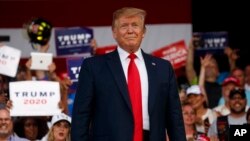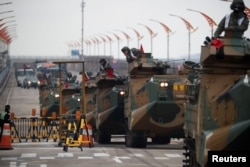Donald Trump on Wednesday suggested South Korea was “rich as hell and probably doesn’t like us too much,” firing the latest shot in a dispute over how to share the cost of the U.S. troop presence here.
Trump did not specifically name South Korea in his comments during a political rally in Florida. But the figures Trump cited match his previous complaints about Seoul, and analysts said there is little doubt who Trump was referencing.
“I won't say the country, but one country we spend a lot of money on defending — [in] very dangerous territory — and it costs us $5 billion,” Trump said.
After complaining that the country in question only contributed around $500 million of that figure, Trump said: “We lose four and a half billion dollars to defend a country that's rich as hell and probably doesn't like us too much.”
Trump also said he told “my people [to] call them and ask for the rest of it and they’ll pay. They’ll pay.”
For decades Trump has criticized U.S. allies — including South Korea, Japan, and various NATO countries — for not paying enough of the cost of U.S. troops on their soil.
But Trump’s Wednesday comment was directed specifically at South Korea, says David Maxwell, a retired U.S. Army Special Forces colonel who is now at the Foundation for the Defense of Democracies.
“It is a hopeful indicator that he did not name Korea and is just using this as campaign rhetoric,” added Maxwell.
Cost-sharing dispute
Trump’s comment could complicate the contentious cost-sharing negotiations between Washington and Seoul that were only temporarily addressed in February with a one-year deal that replaced the previous five-year agreement.
South Korea’s Foreign Ministry did not respond to a VOA request for comment. In the past, South Korean officials have expressed confusion about Trump’s inaccurate statements on the cost-sharing dispute.
South Korea agreed in February to pay $925 million to support the U.S. military presence next year. That represents an 8 percent increase from the previous year — much less than the 50 percent spike Trump had demanded. But days later, Trump claimed he had convinced South Korea to double its share.
Trump says $5 billion is needed annually to pay for U.S. troops and bases in South Korea. Most estimates put that figure closer to $2 billion.
In February, Trump incorrectly said 40,000 U.S. troops are in South Korea. The Pentagon says roughly 28,000 troops are in South Korea to help deter North Korean leader Kim Jong Un.
Trump on alliances
According to a 2018 Gallup poll, 80 percent of South Koreans have a favorable view of the United States. In contrast, just 44 percent of South Koreans have confidence in Trump, the poll found.
During his 2016 presidential campaign, Trump repeatedly questioned the value of U.S. alliances with countries including South Korea, saying they should pay their “fair share” of the costs of U.S. troop deployments.
South Korea rejects Trump’s notion it doesn’t contribute enough toward the cost of the U.S. troops, insisting it pays almost half of the total cost of $2 billion. That doesn’t include the expense of rent-free land for U.S. military bases, Seoul says.
In 2017, South Korea spent 2.6 percent of its gross domestic product on military expenditures, according to World Bank data. That is a bigger percentage than any NATO member, except for the United States.
South Korea also paid for over 90 percent of the cost to build Camp Humphreys, the largest U.S. overseas military base, just 65 kilometers south of Seoul, according to U.S. officials.





